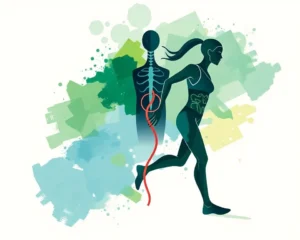May is Mental Health Awareness Month, a time dedicated to highlighting the importance of mental well-being and reducing the stigma associated with mental health conditions. Regular physical activity has been proven to improve mental health. Exercise can reduce stress, anxiety, and negative moods while improving self-esteem and cognitive function.
To help raise awareness and encourage everyone to prioritize their mental health, fitness experts like Jeremy Smoot are sharing accessible workout routines. This article will explore the connection between exercise and mental health, spotlighting workouts, such as those demonstrated by Jeremy Smoot, that promote mental well-being.
The Powerful Link Between Exercise and Mental Health
The benefits of exercise extend far beyond physical health. Research consistently demonstrates a strong connection between physical activity and improved mental well-being. Exercise has a significant impact, playing a role in preventing the development of mental health problems and improving the quality of life for individuals experiencing mental health challenges.
Here’s how exercise can boost your mental health:
- Reduces Stress and Anxiety: Physical activity helps lower stress hormones like cortisol while increasing endorphins, which have mood-boosting effects.
- Improves Mood: Exercise can alleviate symptoms of depression and anxiety by releasing feel-good chemicals in the brain.
- Boosts Self-Esteem: Achieving fitness goals, no matter how small, can increase self-confidence and improve how you feel about yourself.
- Enhances Cognitive Function: Regular exercise can improve memory, focus, and overall cognitive performance.
- Promotes Better Sleep: Physical activity can regulate your sleep cycle, leading to more restful and restorative sleep, which is crucial for mental health.
- Provides Distraction: Exercise can provide a break from negative thoughts and worries, allowing you to focus on the present moment.
- Offers Social Interaction: Exercising with others can provide social support and reduce feelings of loneliness and isolation.
Jeremy Smoot’s Mental Health Awareness Month Workout
Jeremy Smoot, a fitness expert, has shared workout routines specifically designed to promote mental health awareness. These routines are designed to be simple, accessible, and effective for people of all fitness levels.
Focus on Simplicity and Accessibility
One of the key elements of Jeremy Smoot’s approach is simplicity. He emphasizes that workouts don’t need to be complicated or intense to be beneficial. Simple movements and exercises can have a profound impact on both the body and mind. The goal is to make exercise accessible to everyone, regardless of their fitness background or experience.
Key Exercises for Mental Well-being
Jeremy Smoot often incorporates these exercises into his routines:
- Box Breathing: This technique involves exhaling for four seconds, holding for four seconds, inhaling for four seconds, and holding again for four seconds. Box breathing activates the parasympathetic nervous system, promoting relaxation and aiding in recovery.
- Modified Push-Ups: Push-ups are a great way to release endorphins, which are natural mood lifters. Modified push-ups, performed on the knees, make the exercise more accessible for beginners.
- Bicycle Crunches: This exercise targets the core muscles, promoting strength and stability. Focusing on breathing and core contraction can also help improve mental focus.
- In and Out Squats: These squats can be modified to step out or jump out to suit any fitness level.
Tips for Staying Active
- Start Small: Begin with short workouts, such as 10-20 minutes every other day, and gradually increase the duration and intensity as you feel comfortable.
- Find Activities You Enjoy: Choose activities that you find fun and engaging, whether it’s walking, dancing, swimming, or yoga.
- Create a Routine: Set specific times for your workouts and stick to them as much as possible.
- Listen to Music: Music can be a great mood booster and can help you stay motivated during your workouts.
- Set Realistic Goals: Set achievable goals to help you stay on track and celebrate your progress.
- Stay Consistent: Consistency is key to experiencing the mental health benefits of exercise. Aim for regular physical activity most days of the week.
Planet Fitness and Mental Health Awareness
Planet Fitness recognizes the importance of mental health and has launched several initiatives to support mental well-being, especially during Mental Health Awareness Month.
High School Summer Pass Program
Planet Fitness offers free memberships to high school teens aged 14-19 during the summer through its High School Summer Pass program. This initiative aims to help teens prioritize their physical and mental health during a critical time when school is out and structured activities are on pause. Studies show that exercise can have a significant positive impact on teens’ overall wellness.
Accessible and Affordable Fitness
With over 2,500 locations, Planet Fitness provides affordable memberships and a welcoming environment for people of all fitness levels. The gym’s “Judgement Free Zone” promotes a comfortable and non-intimidating atmosphere, making it easier for individuals to start and maintain a fitness routine.
Digital Resources and Wellness Programs
Planet Fitness offers a variety of digital resources, including workout videos and wellness programs, through its mobile app. These resources provide members and non-members alike with access to guided workouts, stress-reduction techniques, and other tools to support their mental and physical health.
Additional Ways to Support Mental Health Awareness
In addition to incorporating exercise into your routine, there are several other ways to support Mental Health Awareness Month:
- Share Your Story: Sharing your personal experiences with mental health can help reduce stigma and inspire others to seek help.
- Educate Yourself: Learn more about mental health conditions, treatments, and resources.
- Offer Support: Reach out to friends, family members, or colleagues who may be struggling with their mental health.
- Advocate for Change: Support policies and initiatives that promote access to mental health care and reduce stigma.
- Participate in Events: Attend local events, workshops, or webinars focused on mental health awareness.
- Use Social Media: Share information, resources, and personal stories on social media to raise awareness and encourage conversations about mental health.
Conclusion: Prioritizing Mental Well-being Through Movement
Mental Health Awareness Month serves as a reminder of the importance of prioritizing our mental well-being. Exercise is a powerful tool that can improve mental health, reduce stress, and enhance overall quality of life. By incorporating simple and accessible workout routines, such as those shared by Jeremy Smoot, and by taking advantage of resources offered by organizations like Planet Fitness, we can all take steps to support our mental health and promote a more compassionate and understanding community.







